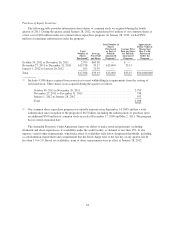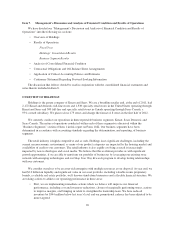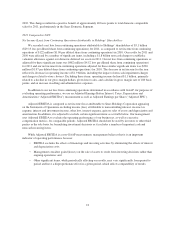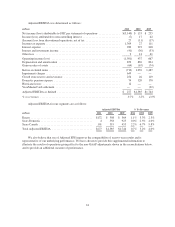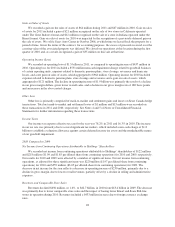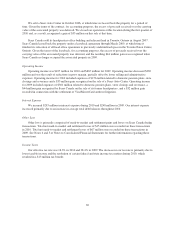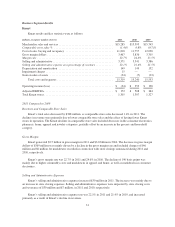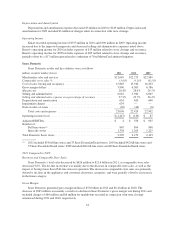Sears 2011 Annual Report Download - page 23
Download and view the complete annual report
Please find page 23 of the 2011 Sears annual report below. You can navigate through the pages in the report by either clicking on the pages listed below, or by using the keyword search tool below to find specific information within the annual report.2010. The change resulted in a positive benefit of approximately 40 basis points to total domestic comparable
sales for 2011, predominately in the Sears Domestic Segment.
2011 Compared to 2010
Net Income (Loss) from Continuing Operations Attributable to Holdings’ Shareholders
We recorded a net loss from continuing operations attributable to Holdings’ shareholders of $3.1 billion
($29.15 loss per diluted share from continuing operations) for 2011, as compared to net income from continuing
operations of $122 million ($1.09 per diluted share from continuing operations) in 2010. Our results for 2011 and
2010 were affected by a number of significant items, including a $1.8 billion non-cash charge to establish a
valuation allowance against our domestic deferred tax assets in 2011. Our net loss from continuing operations as
adjusted for these significant items was $482 million ($4.52 loss per diluted share from continuing operations)
for 2011 and our net income from continuing operations adjusted for these similar significant items was $220
million ($1.97 per diluted share from continuing operations) for 2010. The decrease in net income for the year
reflected a decrease in operating income of $1.9 billion, including the impact of non-cash impairment charges
and charges related to store closures. Excluding these items, operating income declined $1.1 billion, primarily
related to a decline in our gross margin dollars, given lower sales, and a decline in gross margin rate of 180 basis
points, and an increase in selling and administrative expenses.
In addition to our net loss from continuing operations determined in accordance with GAAP, for purposes of
evaluating operating performance, we use an Adjusted Earnings Before Interest, Taxes, Depreciation and
Amortization (“Adjusted EBITDA”) measurement as well as Adjusted Earnings per Share (“Adjusted EPS”).
Adjusted EBITDA is computed as net income (loss) attributable to Sears Holdings Corporation appearing
on the Statements of Operations excluding income (loss) attributable to noncontrolling interest, income tax
expense, interest and investment income, other loss, interest expense, gain on sales of assets and depreciation and
amortization. In addition, it is adjusted to exclude certain significant items as set forth below. Our management
uses Adjusted EBITDA to evaluate the operating performance of our businesses, as well as executive
compensation metrics, for comparable periods. Adjusted EBITDA should not be used by investors or other third
parties as the sole basis for formulating investment decisions as it excludes a number of important cash and
non-cash recurring items.
While Adjusted EBITDA is a non-GAAP measurement, management believes that it is an important
indicator of operating performance because:
• EBITDA excludes the effects of financings and investing activities by eliminating the effects of interest
and depreciation costs;
• Management considers gains/(losses) on the sale of assets to result from investing decisions rather than
ongoing operations; and
• Other significant items, while periodically affecting our results, may vary significantly from period to
period and have a disproportionate effect in a given period, which affects comparability of results.
23







